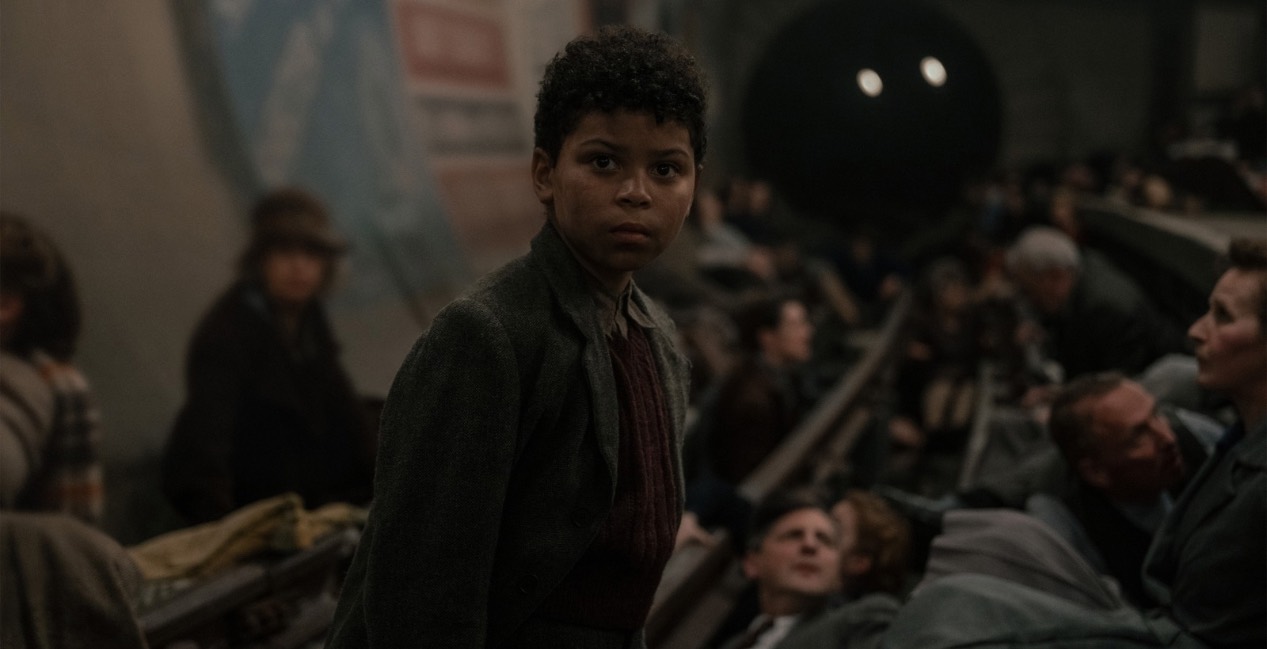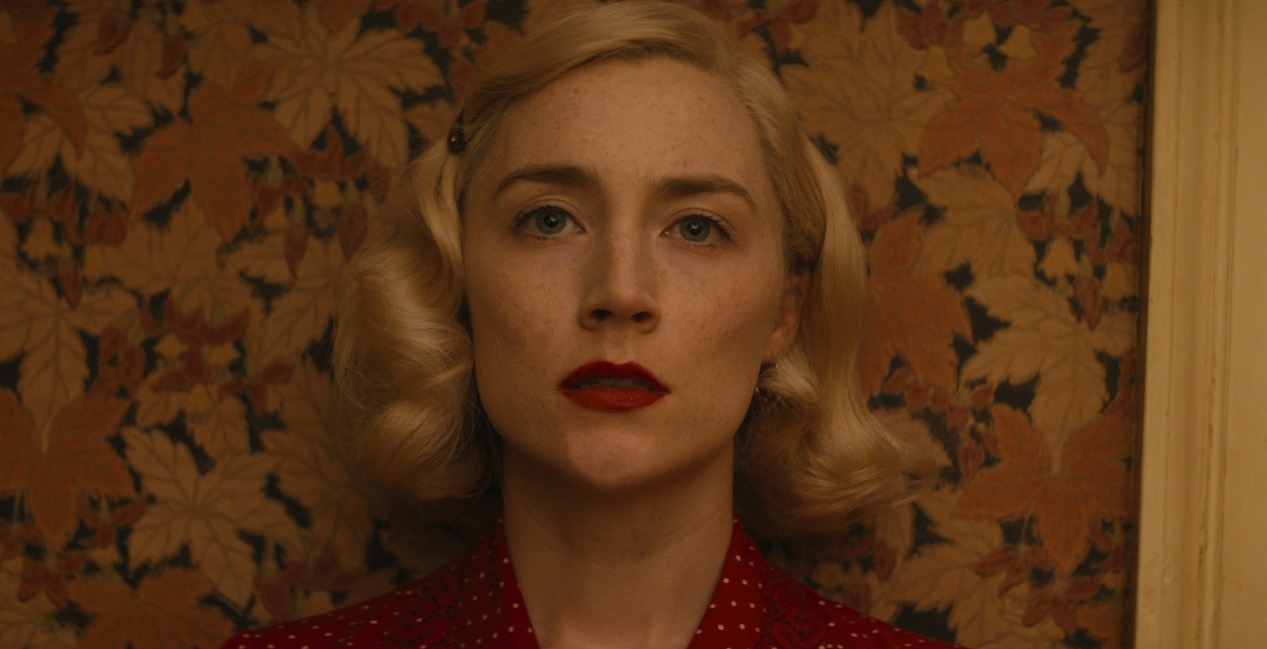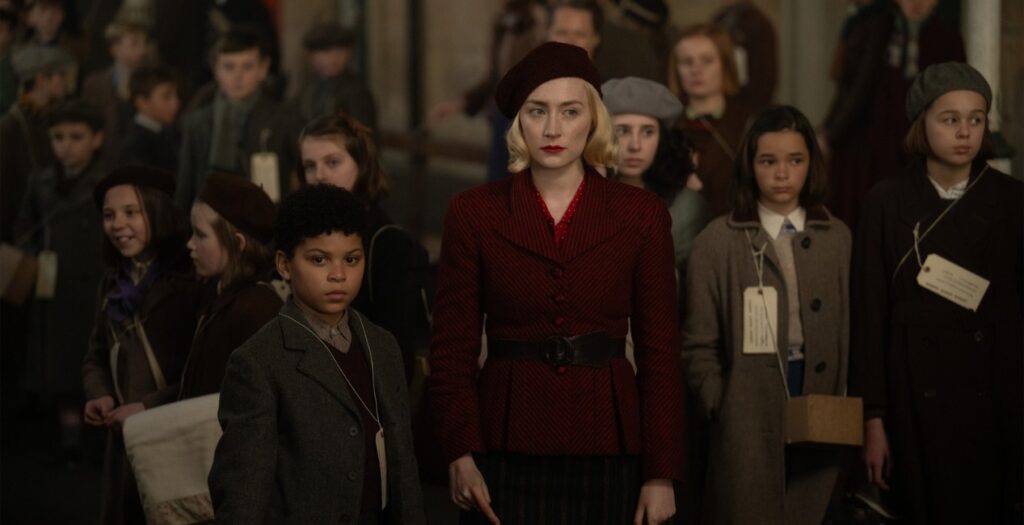Blitz, the latest from director Steve McQueen (Widows, Small Axe), blends the director’s more artful approaches with a sweeping, timeless narrative. While the film doesn’t quite live up to McQueen’s greatest offerings, it certainly pulls from them, crafting an, at times, patchwork story. Despite the classic, fable-like structure, the film refutes linear storytelling for weaving in and out of time to capture a broader, more nuanced story. While that is effective overall, it also leaves portions of the film untethered, more like individual vignettes than pieces of a larger, overarching narrative.
Set during World War II, the film follows nine-year-old George (Elliott Heffernan), who lives with his single mother, Rita (Saoirse Ronan), and his grandfather (Paul Weller). Any semblance of idyllic peace is struck from the film when they suffer an air strike, racing to a local train station to force their way through nonsensical barricades to take shelter underground. In an act spurned from a desperate desire to keep her son safe, Rita plans to have George evacuated to the countryside to escape the bombings. However, a tense send-off sets in motion a harrowing journey.
Consumed with guilt over how he and his mother left off, George abandons the train to safety to make his perilous trek back to London. The adventure is punctuated by many different faces that inform or detract from his efforts to return home. There’s a trio of brothers whose youthful, brief camaraderie is befouled by the cruelty of accidental violence. A conman thief shines a light on the excessive ugliness of the world where death is monetized. In the most touching scene, George meets Ife (Benjamin Clementine), a police officer whose disarming kindness and selflessness offer George — and viewers — a necessary respite.

However, while a perfectly engaging story is at the center of Blitz, it loses itself to maudlin, wartime story trappings, indulging in familiar narrative beats. All of which would be fine if not for McQueen’s involvement. McQueen possesses such a discerning eye that often captures the intricacies of things left unsaid, basking in the imperfections of the human condition. And while there are plenty of moments that cast a critical gaze on the casual cruelties George runs into, it never reaches the subtleties of his previous work. Blitz, in comparison, operates in broad strokes.
Where Blitz truly flounders is with its listless characters who lack greater depth beyond, again, those sweeping characterizations. The film flirts with greater insight. There’s a telling flashback where we learn about what happened to George’s father and the guilt Rita carries with her over it. The interactions between George and the three brothers beautifully depict the brazen fearlessness of youth who haven’t yet learned the horrors of the world. However, they all feel relatively thin due to the back-and-forth between stories and timelines. Ronan, always a consummate performer, delivers a strong performance, though we’re not given enough time to feel the weight of her fear truly.
But again, because this is McQueen, there’s such lush visual texture and haunting framework that it’s impossible not to be entranced. Everything on the technical level is superb. Cinematographer Yorick Le Saux works wonderfully with McQueen, who refuses to strip this increasingly rubble-filled world of color. Costumer Jacqueline Duran aids this, thrilled by Rita’s getups and suggests more personality than is written. The score by Hans Zimmer is suitably anxiety-inducing, infusing each scene with additional tension as we await some tragedy.

Blitz finds its greatest rhythm in either silence or music. McQueen is drawn to the latter, especially following his work in Lovers Rock, which depicts an evident exuberance for dance and performance. McQueen’s reverence for all works of art is clear here, too. From Rita’s slightly pitchy performance, as she sings to rally her factory worker compatriots, to a haunting sequence where we see the before and devastating after of a nightclub struck by a bomb, it’s notable how music is shown to encapsulate life.
But Blitz is also emboldened by what isn’t said. There’s a moment late in the film that visually captures the loss of innocence George faces throughout his arduous journey. While seeking shelter underground, he sees a puppet show as a man tries to entertain the children corralled into these hollow havens. Unlike the other kids whose eyes fly upwards to the show, George stares unmoved, his gaze on the feet peaking beneath the curtain. This refuge of peace isn’t real.
More than anything, what helps Blitz defy its pandering writing and thin characters is that it’s stunning to look at. From the dizzying beginning, where the camera locks itself on the trajectory of a missile until it blurs into something incomprehensible, to a dream sequence spent wandering the slowly lit tunnels and a nauseatingly claustrophobic fight against the elements, the film is visually layered. There’s a richness to the visuals and a nonstop friction that keeps us tethered.
Blitz succeeds due to Steve McQueen’s magnetic direction and relentless tension. However, despite the stress-inducing narrative and the strong ensemble cast, the film doesn’t quite reach the heights of the director’s previous works. It’s effective but lacks a necessary—expected—edge.
Blitz is now in limited theaters and is available to stream on Apple TV+ beginning November 22.
Blitz (2024)
-
Rating - 7/107/10
TL;DR
Blitz succeeds due to Steve McQueen’s magnetic direction and relentless tension. However, despite the stress-inducing narrative and the strong ensemble cast, the film doesn’t quite reach the heights of the director’s previous works.







